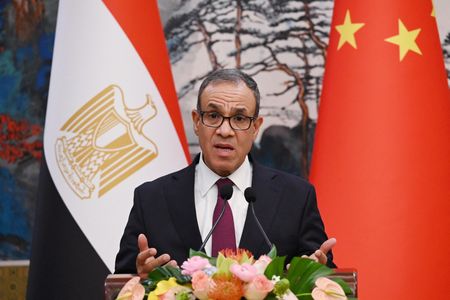MOGADISHU (Reuters) -Somali forces and allied militias have pushed al Shabaab fighters out of a strategic town in central Somalia that the Islamist group has controlled for six years, officials and the African Union (AU) said on Tuesday.
The government, backed by AU troops and clan militias, said it has killed around 700 members of al Shabaab and recaptured scores of settlements as part of a months-long campaign to loosen the al Qaeda-linked group’s control over large swathes of the country.
Mahamud Hasan Mahamud, the mayor of Adan Yabal in Middle Shabelle region, said the army and militias had taken control of the town and the surrounding district of the same name without encountering resistance on Monday.
“This district of Adan Yabal was very important for al Shabaab because it is the heart that connects the central regions and the south of Somalia. It was also their main base from which they manage the central regions,” Mahamud told Reuters late on Monday.
He said the troops were sweeping the town, which is around 240km (150 miles) northeast of the capital Mogadishu, for mines.
President Hassan Sheikh Mohamud said al Shabaab’s fighters had taken residents of the town as human shields and destroyed infrastructure.
“They took with them pumps of the wells and some residents as (human) shields for fear of being bombed,” he said in a televised address after the town’s capture.
Al Shabaab’s spokespeople were not immediately reachable to comment on the town’s capture and the accusations of holding residents as human shields.
The head of the AU mission in Somalia, Mohammed El-Amine Souef, described the town as a training ground for al Shabaab, and said the broader campaign was delivering “destructive and decisive” blows against the group.
Al Shabaab frequently abandons areas before army offensives, but the government often fails to hold recaptured territory, analysts say, allowing the militants to return.
“When they entered the town, al Shabaab were not there,” Absher Mudey, a shop owner in Adan Yabal, told Reuters by telephone. “Most of the people fled because they were afraid that fighting would break out.”
(Reporting by Abdiqani Hassan and Abdi Sheikh; Writing by George Obulutsa and Hereward Holland; Editing by Gareth Jones and Raissa Kasolowsky)









